6 books about Troubadours
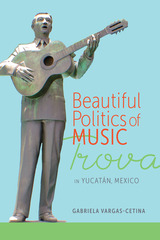
Beautiful Politics of Music
Trova in Yucatán, Mexico
Gabriela Vargas-Cetina
University of Alabama Press, 2017
An exploration into the history and practice of trova, a genre of music that is the soul of Yucatán.
Yucatecan trova is a music genre comprising a type of romantic song that is considered “the soul of Yucatán and Yucatecans.” This first book on Yucatecan trova offers an insider’s view of the history and practice of a treasured cultural heritage. A central theme of Gabriela Vargas-Cetina’s ethnography is what she refers to as the “beautiful politics of music” practiced by Yucatecan trova patrons and organizations, which is a way of asserting the importance of groups and issues through nonconfrontational means.
Trova emerged on the peninsula at the end of the nineteenth century and continues to be part of the general urban soundscape in the states of Yucatán and Campeche. Until the 1920s, this music was little known outside Yucatán and became absorbed into the larger Latin American Bolero genre, making it difficult to perceive its uniqueness and relation to life in Yucatán.
Vargas-Cetina, a native Yucatecan and trova musician, offers ethnographic insight into the local music scene. With family connections, she embedded herself as a trovadora, and her fieldwork—singing, playing the guitar in a trova group, and extensively researching the genre and talking with fellow enthusiasts and experts—ensued. Trova, like other types of artistic endeavors, is the result of collaboration and social milieu. She describes the dedicated trova clubs, cultural institutions, the Yucatecan economy of agricultural exports, and identity politics that helped the music come about and have maintained it today.
Positioned in the larger context of the music of Mexico and Latin America and engaging with theories of modernity and cosmopolitanism, experimental ethnography, and the anthropology of organizations, Beautiful Politics of Music consists of rigorous scholarship. It is also a warm tribute to performers and songs that have inspired many people around the world for more than two centuries.
Yucatecan trova is a music genre comprising a type of romantic song that is considered “the soul of Yucatán and Yucatecans.” This first book on Yucatecan trova offers an insider’s view of the history and practice of a treasured cultural heritage. A central theme of Gabriela Vargas-Cetina’s ethnography is what she refers to as the “beautiful politics of music” practiced by Yucatecan trova patrons and organizations, which is a way of asserting the importance of groups and issues through nonconfrontational means.
Trova emerged on the peninsula at the end of the nineteenth century and continues to be part of the general urban soundscape in the states of Yucatán and Campeche. Until the 1920s, this music was little known outside Yucatán and became absorbed into the larger Latin American Bolero genre, making it difficult to perceive its uniqueness and relation to life in Yucatán.
Vargas-Cetina, a native Yucatecan and trova musician, offers ethnographic insight into the local music scene. With family connections, she embedded herself as a trovadora, and her fieldwork—singing, playing the guitar in a trova group, and extensively researching the genre and talking with fellow enthusiasts and experts—ensued. Trova, like other types of artistic endeavors, is the result of collaboration and social milieu. She describes the dedicated trova clubs, cultural institutions, the Yucatecan economy of agricultural exports, and identity politics that helped the music come about and have maintained it today.
Positioned in the larger context of the music of Mexico and Latin America and engaging with theories of modernity and cosmopolitanism, experimental ethnography, and the anthropology of organizations, Beautiful Politics of Music consists of rigorous scholarship. It is also a warm tribute to performers and songs that have inspired many people around the world for more than two centuries.
[more]
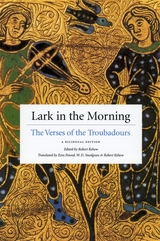
Lark in the Morning
The Verses of the Troubadours, a Bilingual Edition
Edited by Robert Kehew
University of Chicago Press, 2005
Although the troubadours flourished at the height of the Middle Ages in southern France, their songs of romantic love, with pleasing melodies and intricate stanzaic patterns, have inspired poets and song writers ever since, from Dante to Chaucer, from Renaissance sonneteers to the Romantics, and from Verlaine and Rimbaud to modern rock lyricists. Yet despite the incontrovertible influence of the troubadours on the development of both poetry and music in the West, there existed no comprehensive anthology of troubadour lyrics that respected the verse form of the originals until now.
Lark in the Morning honors the meter, word play, punning, and sound effects in the troubadours' works while celebrating the often playful, bawdy, and biting nature of the material. Here, Robert Kehew augments his own verse translations with those of two seminal twentieth-century poets—Ezra Pound and W. D. Snodgrass—to provide a collection that captures both the poetic pyrotechnics of the original verse and the astonishing variety of troubadour voices. This bilingual edition contains an introduction to the three major periods of the troubadours—their beginning, rise, and decline—as well as headnotes that briefly put each poet in context. Lark in the Morning will become an essential collection for those interested in learning about and teaching the origins of Western vernacular poetry.
Lark in the Morning honors the meter, word play, punning, and sound effects in the troubadours' works while celebrating the often playful, bawdy, and biting nature of the material. Here, Robert Kehew augments his own verse translations with those of two seminal twentieth-century poets—Ezra Pound and W. D. Snodgrass—to provide a collection that captures both the poetic pyrotechnics of the original verse and the astonishing variety of troubadour voices. This bilingual edition contains an introduction to the three major periods of the troubadours—their beginning, rise, and decline—as well as headnotes that briefly put each poet in context. Lark in the Morning will become an essential collection for those interested in learning about and teaching the origins of Western vernacular poetry.
[more]
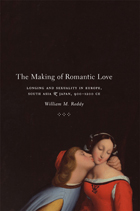
The Making of Romantic Love
Longing and Sexuality in Europe, South Asia, and Japan, 900-1200 CE
William M. Reddy
University of Chicago Press, 2012
In the twelfth century, the Catholic Church attempted a thoroughgoing reform of marriage and sexual behavior aimed at eradicating sexual desire from Christian lives. Seeking a refuge from the very serious condemnations of the Church and relying on a courtly culture that was already preoccupied with honor and secrecy, European poets, romance writers, and lovers devised a vision of love as something quite different from desire. Romantic love was thus born as a movement of covert resistance.
In The Making of Romantic Love: Longing and Sexuality in Europe, South Asia, and Japan, William M. Reddy illuminates the birth of a cultural movement that managed to regulate selfish desire and render it innocent—or innocent enough. Reddy strikes out from this historical moment on an international exploration of love, contrasting the medieval development of romantic love in Europe with contemporaneous eastern traditions in Bengal and Orissa, and in Heian Japan from 900-1200 CE, where one finds no trace of an opposition between love and desire. In this comparative framework, Reddy tells an appealing tale about the rise and fall of various practices of longing, underscoring the uniqueness of the European concept of sexual desire.
[more]
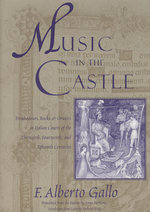
Music in the Castle
Troubadours, Books, and Orators in Italian Courts of the Thirteenth, Fourteenth, and Fifteenth Centuries
F. Alberto Gallo
University of Chicago Press, 1996
Written by one of Italy's most eminent scholars of music, this book explores music's place in the cultural, artistic, and literary life of medieval Italian courts, paying particular attention to the influence of French culture on Italian artistic and musical traditions.
In the first of three elegant essays, Gallo examines the troubadours who traveled to northern Italian courts from Provence during the thirteenth century. He discusses their performance practices, the verbal and musical sophistication of their songs, and their role in the daily life of courtiers at Genoa, Ferrara, and Monferrato. The second essay concerns the now dispersed collection of the Visconti library at Pavia. Here, Gallo examines how this collection expressed the tastes of the fourteenth-century court of Giangaleazzo Visconti, how French arts were imported and imitated at Pavia, and the effects this had on music heard at the court. In the final essay, Gallo looks at the fifteenth-century tradition of improvised music, and especially the virtuoso lute player Pietrobono. Mythologized in literary circles of his day, Pietrobono becomes a point of departure for a discussion of the entire vision of music of Italian humanists, from Guarino Veronese to Aurelio Brandolini.
In the first of three elegant essays, Gallo examines the troubadours who traveled to northern Italian courts from Provence during the thirteenth century. He discusses their performance practices, the verbal and musical sophistication of their songs, and their role in the daily life of courtiers at Genoa, Ferrara, and Monferrato. The second essay concerns the now dispersed collection of the Visconti library at Pavia. Here, Gallo examines how this collection expressed the tastes of the fourteenth-century court of Giangaleazzo Visconti, how French arts were imported and imitated at Pavia, and the effects this had on music heard at the court. In the final essay, Gallo looks at the fifteenth-century tradition of improvised music, and especially the virtuoso lute player Pietrobono. Mythologized in literary circles of his day, Pietrobono becomes a point of departure for a discussion of the entire vision of music of Italian humanists, from Guarino Veronese to Aurelio Brandolini.
[more]
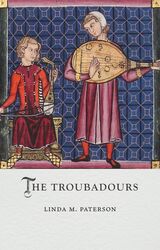
The Troubadours
Linda M. Paterson
Reaktion Books, 2024
An engaging and accessible introduction to the music, poetry, and lives of the medieval singer-songwriters.
Composing songs of love and war in medieval Western and Southern Europe, troubadours spanned the social spectrum from powerful nobles to penniless minstrels. This book delves into the everyday worlds of these remarkable poet-musicians, famed for their innovative use of language and music as well as the lasting impact of their work on audiences then and now. The troubadours’ songs explored ideas about courtly love as well as medieval perceptions of gender, class, war, and chivalry. Linda M. Paterson examines the troubadours’ music, performance, and legacy, pairing fresh translations with the original texts to highlight the enduring beauty of their songs and poetry.
Composing songs of love and war in medieval Western and Southern Europe, troubadours spanned the social spectrum from powerful nobles to penniless minstrels. This book delves into the everyday worlds of these remarkable poet-musicians, famed for their innovative use of language and music as well as the lasting impact of their work on audiences then and now. The troubadours’ songs explored ideas about courtly love as well as medieval perceptions of gender, class, war, and chivalry. Linda M. Paterson examines the troubadours’ music, performance, and legacy, pairing fresh translations with the original texts to highlight the enduring beauty of their songs and poetry.
[more]

Troubadours, Trumpeters, Troubled Makers
Lyricism, Nationalism, and Hybridity in China and Its Others
Gregory B. Lee
Duke University Press, 1996
How have the lyrics of poets and songwriters, traditionally voices of protest against domination and exploitation in Chinese society, responded to the forces of cultural imperialism and nationalistic ideology that have accompanied the modernization of Chinese society in the last half of this century. Gregory B. Lee suggests that the response can be seen in a proliferation of hybrid lyric forms and cultures—from both within China and beyond—and that China’s "culture of lyricism" contributes in powerful, significant, and often resistant ways to the nation’s sense of itself and its encounter with modernity.
Lee’s broad definition of lyric includes the work of poets, amateur versifiers, and all manner of popular songwriters, and his inclusive sense of nation refers to all Chinese communities regardless of geographic location. Whether examining the globalized consumption of satellite-broadcast pop music or the heroic efforts of little-known poets on the margins of the Chinese diaspora, he finds a questioning and contesting of both the Orientalist construction of a mythic monolithic China invented by the West and the Chinese obsession with ideas of authenticity and purity of nationhood. Lee explores the lyrical transgression of these ideological boundaries in China, in the Chinese communities of America and Britain, and in other marginalized communities, before using the examples of Hong Kong and other non-nationalistic sites to discuss the creative possibilities of hybrid cultures and societies.
Lee’s broad definition of lyric includes the work of poets, amateur versifiers, and all manner of popular songwriters, and his inclusive sense of nation refers to all Chinese communities regardless of geographic location. Whether examining the globalized consumption of satellite-broadcast pop music or the heroic efforts of little-known poets on the margins of the Chinese diaspora, he finds a questioning and contesting of both the Orientalist construction of a mythic monolithic China invented by the West and the Chinese obsession with ideas of authenticity and purity of nationhood. Lee explores the lyrical transgression of these ideological boundaries in China, in the Chinese communities of America and Britain, and in other marginalized communities, before using the examples of Hong Kong and other non-nationalistic sites to discuss the creative possibilities of hybrid cultures and societies.
[more]
READERS
Browse our collection.
PUBLISHERS
See BiblioVault's publisher services.
STUDENT SERVICES
Files for college accessibility offices.
UChicago Accessibility Resources
home | accessibility | search | about | contact us
BiblioVault ® 2001 - 2024
The University of Chicago Press









